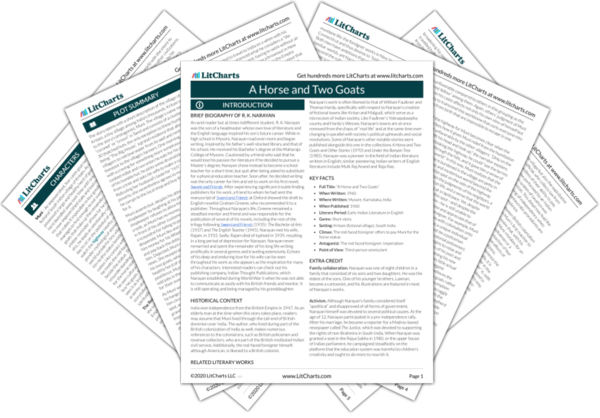Muni Quotes in A Horse and Two Goats

Unlock explanations and citation info for this and every other A Horse and Two Goats quote.
Plus so much more...
Get LitCharts A+“Please, please. I will speak slowly…Can’t you understand even a simple word of English? Everyone in this country seems to know English. I have got along with English everywhere in this country, but you don't speak it. Have you any religious or spiritual scruples against English speech?”
“You see, last August, we probably had the hottest summer in history, and I was working in shirt-sleeves in my office on the fortieth floor of the Empire State Building. We had a power failure one day, you know, and there I was stuck for four hours, no elevator, no air conditioning. All the way in the train I kept thinking, and the minute I reached home in Connecticut, I told my wife Ruth, ‘We will visit India this winter, it's time to look at other civilizations.’”
“I don’t want to seem to have stopped here for nothing. I will offer you a good price for this," he said, indicating the horse. He had concluded without the least doubt that Muni owned this mud horse. Perhaps he guessed by the way he sat at its pedestal, like other souvenir-sellers in this country presiding over their wares.
"This is our guardian, it means death to our adversaries. At the end of Kali Yuga, this world and all other worlds will be destroyed, and the Redeemer will come in the shape of a horse called 'Kalki'; this horse will come to life and gallop and trample down all bad men… [T]he oceans are going to close over the earth in a huge wave and swallow us—this horse will grow bigger than the biggest wave and carry on its back only the good people and kick into the floods the evil ones.”
“Lend me a hand and I can lift off the horse from its pedestal after picking out the cement at the joints. We can do anything if we have a basis of understanding” … He flourished a hundred-rupee currency note… The old man now realized that some financial element was entering their talk. He peered closely at the currency note, the like of which he had never seen in his life… He laughed to himself at the notion of anyone coming to him for changing a thousand- or ten-thousand-rupee note.

Muni Quotes in A Horse and Two Goats

Unlock explanations and citation info for this and every other A Horse and Two Goats quote.
Plus so much more...
Get LitCharts A+“Please, please. I will speak slowly…Can’t you understand even a simple word of English? Everyone in this country seems to know English. I have got along with English everywhere in this country, but you don't speak it. Have you any religious or spiritual scruples against English speech?”
“You see, last August, we probably had the hottest summer in history, and I was working in shirt-sleeves in my office on the fortieth floor of the Empire State Building. We had a power failure one day, you know, and there I was stuck for four hours, no elevator, no air conditioning. All the way in the train I kept thinking, and the minute I reached home in Connecticut, I told my wife Ruth, ‘We will visit India this winter, it's time to look at other civilizations.’”
“I don’t want to seem to have stopped here for nothing. I will offer you a good price for this," he said, indicating the horse. He had concluded without the least doubt that Muni owned this mud horse. Perhaps he guessed by the way he sat at its pedestal, like other souvenir-sellers in this country presiding over their wares.
"This is our guardian, it means death to our adversaries. At the end of Kali Yuga, this world and all other worlds will be destroyed, and the Redeemer will come in the shape of a horse called 'Kalki'; this horse will come to life and gallop and trample down all bad men… [T]he oceans are going to close over the earth in a huge wave and swallow us—this horse will grow bigger than the biggest wave and carry on its back only the good people and kick into the floods the evil ones.”
“Lend me a hand and I can lift off the horse from its pedestal after picking out the cement at the joints. We can do anything if we have a basis of understanding” … He flourished a hundred-rupee currency note… The old man now realized that some financial element was entering their talk. He peered closely at the currency note, the like of which he had never seen in his life… He laughed to himself at the notion of anyone coming to him for changing a thousand- or ten-thousand-rupee note.











